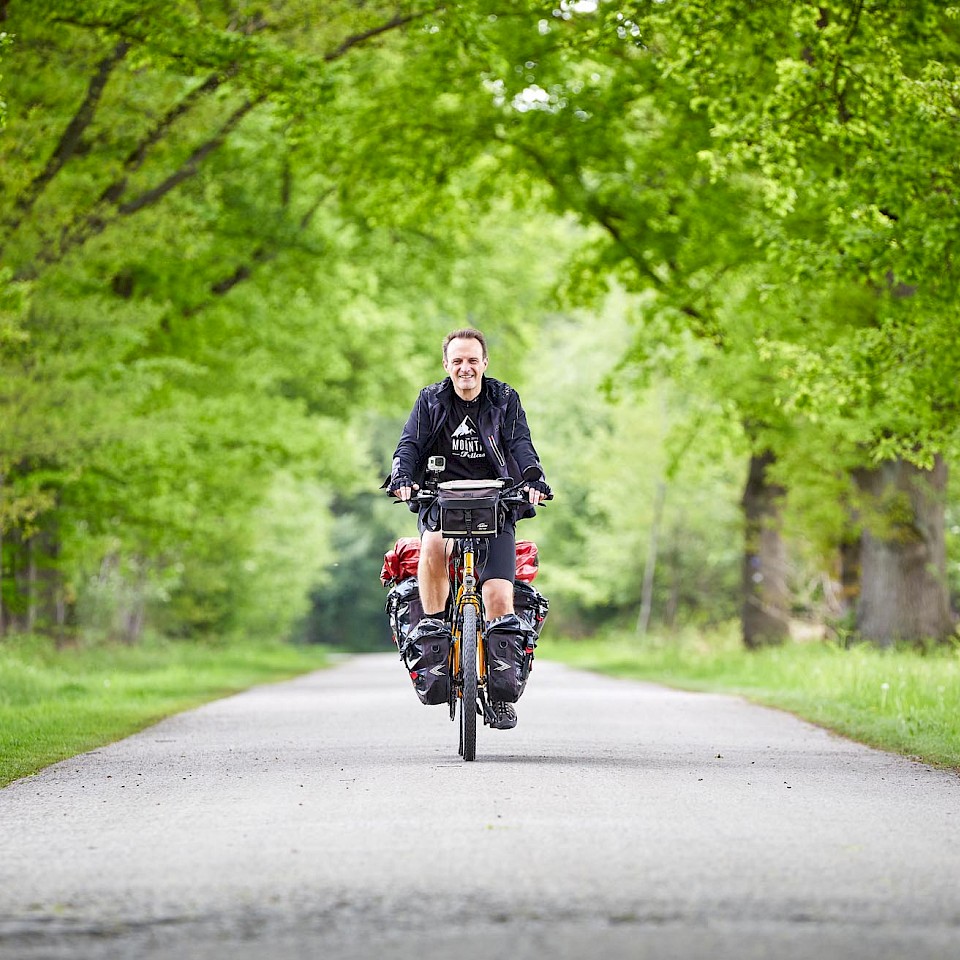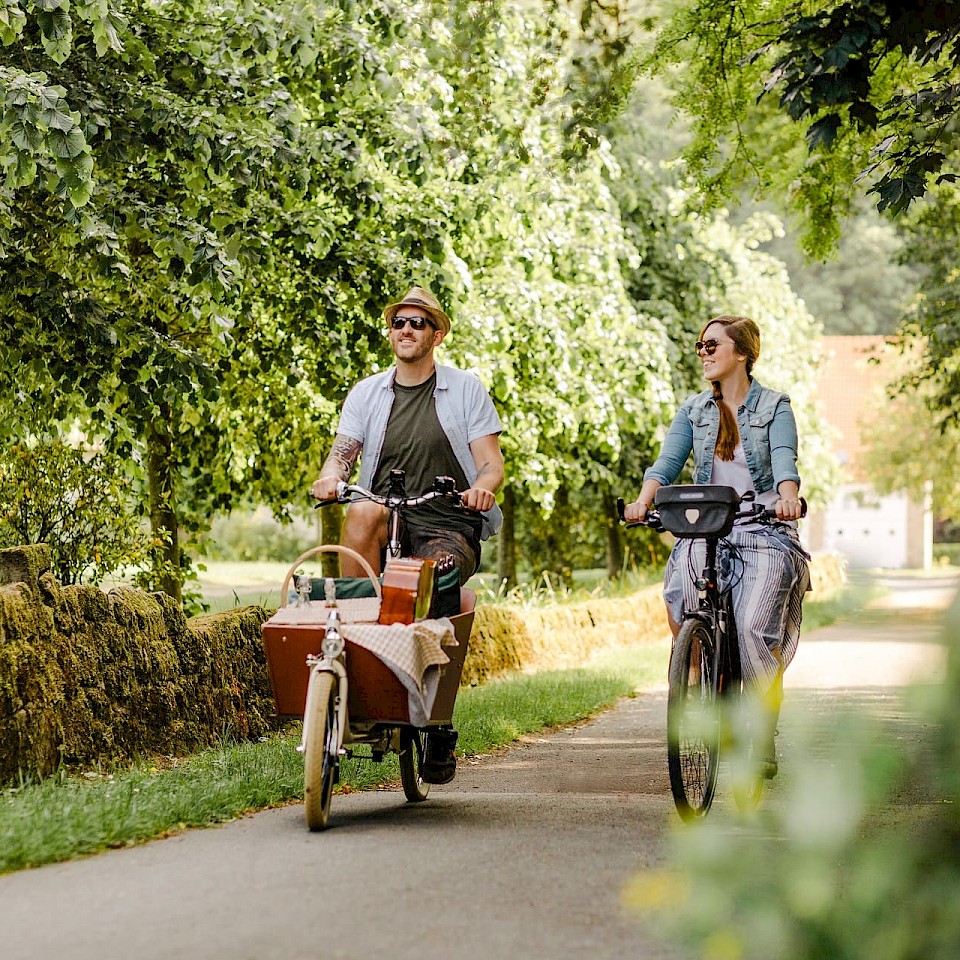Discover German and European culture and history by bike: New funding project for upgrading the R1 - D-Route 3 gets underway
Münsterland e.V. takes over overall coordination
If you travel by bike, you perceive the world in a completely different way - for example, on the R1 European Cycle Route. In Germany, it runs as D-Route 3 from the Dutch border at Zwillbrock to Küstrin on the border to Poland and connects not only five federal states and seven tourist regions, but also landscapes, cultural assets and mentalities. Through it, Germany's cycling network is gaining in importance and, in the best case scenario, in popularity. A new funding project entitled "Quality and attractiveness enhancement in the German cycle network - route and usage analysis, stakeholder networking and digital marketing using the D-Route 3 - Europaradadweg R1 as an example with the aim of stabilising cycle tourism and thus the tourism industry" - in short: D3-R1-Attraktiv - is intended to provide support here with immediate effect. The funding body is the Federal Ministry of Digital Affairs and Transport, which is supporting the project with a grant of around 443,445 euros.
"The route leads through a variety of landscapes and a wide range of cultural activities. Since the route is predominantly close to nature, it is particularly well suited to make the special charm of a cycling holiday tangible and to awaken the desire for cycling," says Jörn Berding, who is responsible for the overall coordination at Münsterland e.V.. "With its connection to Western and Eastern Europe, the route is also a symbol for the tourist unification of the continent and the spatial possibilities of long-distance cycling. With its trans-European significance, it thus stands as an example of the versatility of Germany's entire cycling network. Münsterland also benefits from this."
To keep it that way, one focus of the project is to increase the quality of the cycling experience. The basis for this is an analysis of the current routes and their use as well as strengthening and networking the stakeholders along the route. The second focus is a well-aligned marketing strategy. "The cultural-historical potential and highlights of the tourist regions through which the R1 passes should come to the fore. In Münsterland, these are of course the castles and palaces in the beautiful park landscape," says Berding. "In addition, there are historic cityscapes, sites of significant historical events and UNESCO World Heritage sites in the other regions."
As a transnational joint project, the project is based on the close cooperation of three project partners with many years of expertise in cycle tourism: Münsterland e.V., which also hosts the office of the AG Europaradweg R1-Anrainerkommunen NRW, is responsible for the overall coordination of the project on behalf of the working group. Other partners are the World Heritage Region Anhalt-Dessau-Wittenberg e.V. and the Local Action Group (LAG) Fläming-Havel e.V. For the "gap closure" in the Lower Saxony part of the D3-R1, there is also cooperation with the Solling-Vogler-Region im Weserbergland e.V. and the Harzer Tourismusverband e.V.
"We are pleased that Münsterland e.V. has been entrusted with the overall coordination. As a successful cycling region, we bring a lot of experience to the project," says Michael Kösters, head of tourism at Münsterland e.V. "In addition, the topic of cycling has become an important economic factor, from which especially the service providers in rural areas benefit."
In addition to Münsterland, the R1 also runs through the tourist regions of Teutoburger Wald, Weserbergland, Harz, Elbe/Fläming, Berlin and Oderland.
Further project information
The D3-R1-Attraktiv project is funded by the Federal Ministry of Digital Affairs and Transport (BMDV) as part of the "Expansion and Extension of the German Cycle Network" programme, coordinated by the German Cycle Network Office at the Federal Office for Goods Transport (BAG). The Cycling Network Germany forms the network of cycle routes of national importance and consists of the twelve 'D-Routes', the 'German Unity Cycle Route' and the 'Iron Curtain Trail'. The German cycle network covers around 11,700 kilometres and is also part of the European long-distance cycle route network 'EuroVelo' and thus of international importance. With this funding programme, the federal government is providing financial support to improve the quality, awareness and attractiveness of the German cycling network.
Within the framework of an "early start of measures", the first project activities could already begin on 1 April 2022; the project now approved will run until 30 June 2024. The funding quota is 75 percent of the total eligible expenditure of 591,261 euros; the remaining share will be provided by the project partners.
Download images
The following images may be used for media coverage in connection with this press release. If you need it for other purposes, please contact presse@muensterland.com.
Your contact persons
 Jörn Berding
Jörn Berding© Münsterland e.V./Anja Tiwisina







